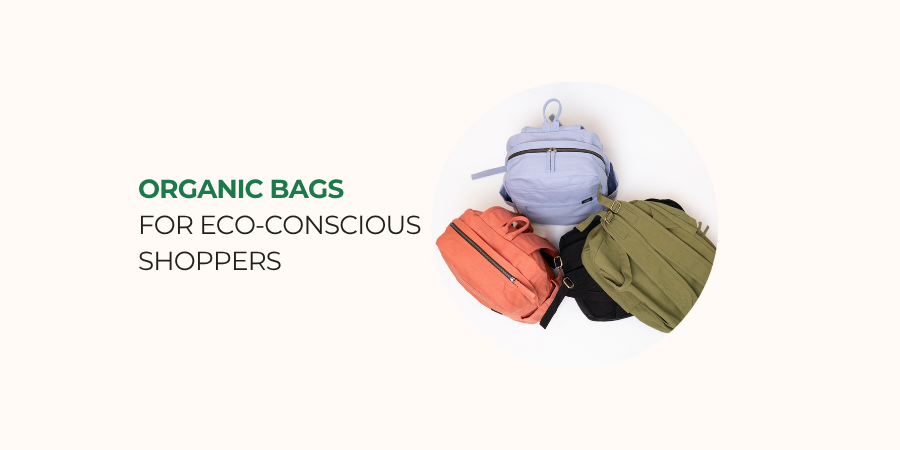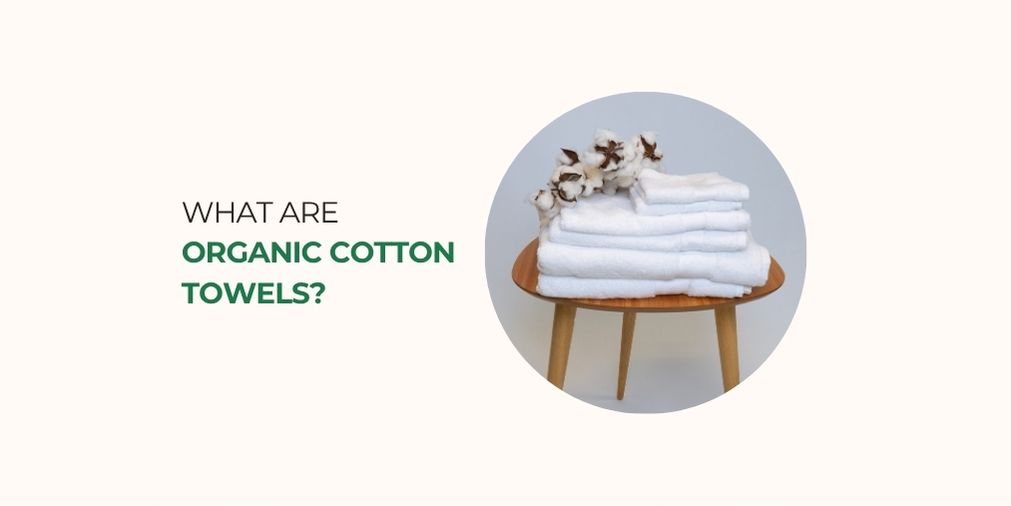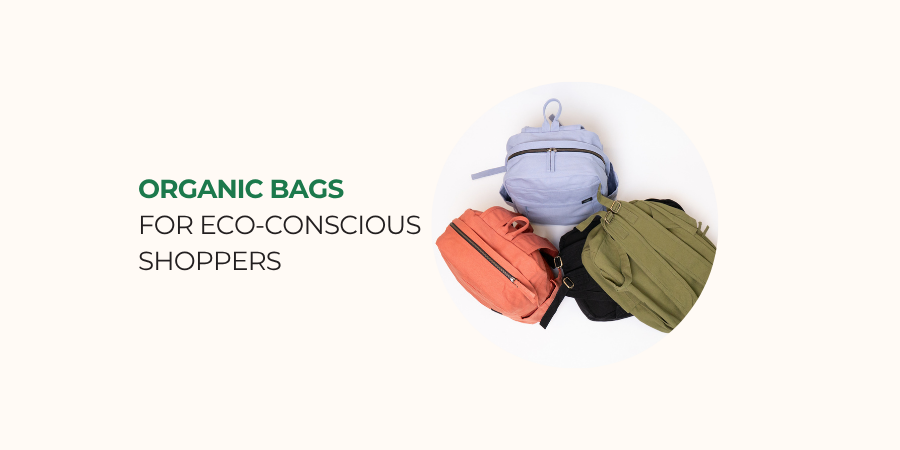Table of Contents
- What Are Organic Bags
- Why Choose Organic Bags Over Conventional Options
- Top Organic Bags for Conscious Shoppers in 2025
- How to Choose the Right Organic Bag for Your Needs
- Caring for Your Organic Bags || Maintenance Tips
- Sustainable Shopping Tips for Conscious Consumers
- Terra Thread's Commitment to Sustainability
- Conclusion
- FAQ
As people across the globe become more conscious of their environmental footprint, organic bags are fast becoming the go-to choice for conscious shoppers.

According to reports, the sustainable bag industry is expected to reach 75.9 billion (USD) by 2034 from 27.28 billion (USD) in 2025. From the market aisles to office corridors, we're seeing a rise in sustainable bags, and it's not just a trend, it's a transformation.
Over 5 trillion plastic bags are consumed each year globally, and they take hundreds of years to degrade, poisoning our land and choking our seas. Organic bags, on the contrary, are biodegradable, durable, and often made with eco-friendly materials like organic cotton and hemp. They align beautifully with the principles of sustainable fashion and support ethical manufacturing. So if you've been thinking about making better choices, this might be the simplest yet most powerful switch you can make.
Today, we'll explore what organic bags really are, how to choose the right one, and which options are best in 2025.
What Are Organic Bags?
At the core, organic bags are made from materials that are grown without the use of synthetic pesticides or harmful chemicals and are certified organic. This makes them safer not just for us, but also for the farmers who grow the raw materials, the workers who make the bags, and the environment that supports us all.
Conventional bags, often made from polyester, nylon, or plastic, are petroleum-based. They contribute heavily to microplastic pollution (can discharge up to 700, 000 per laundry load) and carry a high carbon footprint. Conventional cotton bags are typically produced using chemical-intensive methods, which involve the use of pesticides, fertilizers, and toxic dyes that can harm the environment and farm workers.
In contrast, natural fibers like organic cotton canvas bags rely on sustainable materials that are renewable and biodegradable. It is soft, durable, and renewable, and can reduce water usage by up to 91% less water than conventional cotton. Such materials don't just benefit the environment but support your values. They help reduce landfill waste, lower energy consumption, and promote eco-friendly shopping.

Why Choose Organic Bags Over Conventional Options
Environmentally friendly bags are a statement of values. Here's why more people are opting for them over traditional alternatives:
- Environmental Impact: Plastic and polyester bags are derived from fossil fuels. Their production emits large amounts of CO2.
- Health & Safety: Many conventional bags contain chemical dyes and finishes. Organic cotton bags use natural or low-impact dyes, avoiding skin irritation.
- Durability: These bags are strong. They can last for years with proper care, much longer than single-use plastic or thin tote bags.
| Feature | Organic Bags | Conventional Bags |
|---|---|---|
| Materials | Organic cotton | Polyester, plastic |
| Environmental Impact | Low, biodegradable | High, non-biodegradable |
| Chemicals Used | Minimal or none | High (dyes, finishes) |
| Durability | High | Low to moderate |
| Cost | Slightly higher upfront | Lower, but short lifespan |
By choosing environmentally friendly bags, you are actively reducing your carbon footprint and making a shift toward green living.
Top Organic Bags for Conscious Shoppers in 2025
Best Organic Backpacks
Everyday Earth Backpack
- Made from heavy-duty organic cotton fabric
- Spacious main compartment + internal laptop sleeve.
- Ideal for students, commuters, and travelers
Use Case Tip: Pair with neutral outfits for a minimal, everyday look.
Best Organic Tote Bags
Executive Work Tote Bag
- Structured design with multiple compartments
- Stylish enough for office use
- Built to fit a laptop, notebooks, water bottle, and more.
Best Organic Travel Bags
Bumi Eco Duffel Bag
- Weekend trips sorted
- Lightweight and spacious with approximately 56L capacity
- Internal and external pockets
Sustainable Fanny Pack
- Compact and versatile design, perfect for daily errands or outdoor adventures
- Spacious enough to hold essentials like phone, wallet, keys, and small accessories
- Ideal for hands-free convenience on the go
How to Choose the Right Organic Bag for Your Needs
We all live different lives, and that means our needs for bags vary as well. Whether you're running daily errands, heading to work, or packing for a trip, choosing the right organic bag can make a big difference in both convenience and style. Here's a simple guide to help you find the perfect bag that fits your lifestyle and values.
Size Matters
The size of your bag should match the tasks you face every day.
- If you're running daily errands, a medium-sized tote is often the best choice. Big enough to carry essentials but not bulky.
- For grocery shopping, look for reusable mesh bags that can comfortably hold your haul without tearing.
- If you travel frequently, consider a roomy duffel or backpack that can fit clothes, toiletries, and other essentials easily.
Material Preference
The material your bag is made from will affect its durability, look, and feel. So it's important to pick what suits your needs.
- If you prefer a bag that keeps its shape, holds for years, and looks polished, organic cotton bags are a great option as they are sturdy and versatile.
- If you need a bag that stands up to rain or rough weather, materials like cork or waxed cotton offer natural water resistance.
Purpose Comes First
Think about what you'll mainly use the bag for:
- For work or school, you'll want bags with multiple compartments and dedicated laptop sleeves to keep things organized and protected.
- For casual shopping or quick trips, a lightweight and foldable tote is ideal because it can be easily stored when not in use.
- When it comes to travel, comfort is key. So, look for ergonomic designs to make carrying easier over longer distances.
Budget
Organic bags come in a wide price range. It may be tempting to go for the cheapest option, but consider the purchase as an investment in a sustainable lifestyle. A well-made bag may cost a little more upfront, but it will last longer, reduce waste, and support ethical production practices. In the end, that's money well spent.
By keeping these points in mind, you can confidently choose an organic bag that fits your daily routine, matches your style, and supports your commitment to sustainability.
Caring for Your Organic Bags || Maintenance Tips
When you invest in an eco-conscious bag, you're making a choice to support the planet and that means taking good care of it to ensure it lasts as long as possible. Proper maintenance not only keeps your bag looking great but also helps reduce waste by preventing early replacement. Here are some simple tips to keep your organic bags in top shape.
Clean Gently
Natural materials like organic cotton require a gentle touch.
- Whenever your bag needs cleaning, hand-wash it with a mild detergent designed for delicate fabrics. Avoid strong soaps or detergents that contain bleach or harsh chemicals, as these can weaken the fibers and damage the fabric over time.
- After washing, lay the bag flat or hang it by the handles in the shade to air dry; heaters, dryers, or bright sunlight will shrink, warp, and ruin the shape.
Store Right
Proper storage is just as important as cleaning.
- When not in use, store your bag in a cool, dry place away from direct sunlight, which can fade colors and weaken materials.
- For bags with a structured design or stiff material, avoid folding or crushing them during storage. Instead, keep them upright or gently stuffed with tissue paper to help maintain their shape.
Repair Over Replace
The greenest move you can make with a cherished bag is to mend it instead of tossing it for a new one.
- If you spot a tiny rip or a loose thread, stitch it up right away-so the damage doesn't spread.
- Straps or zippers sometimes wear out. So, rather than discarding the entire bag, consider having these parts replaced or fixed by a professional.
- These small acts of care can greatly extend the life of your bag and reduce unnecessary waste.
Sustainable Shopping Tips for Conscious Consumers
Shopping mindfully doesn't mean aiming for perfection; it means linking small good intentions to actions that add up over time. With that in mind, here are some practical tips to help you shop more sustainably and live more consciously.
Zero Waste Shopping
Adopting a zero waste mindset is one of the quickest ways to trim your everyday footprint.
- Before you head to the store, carry your own reusable containers and bags to avoid single-use plastics and packaging.
- When possible, buy in bulk-or at least ask the staff to skip that glossy wrapper-to cut back on extra cardboard, foil, and shrink wrap.
- Don't be afraid to say no to plastic, whether it's bags, straws, or unnecessary wrapping. Small actions like these help cut down the massive plastic pollution problem we face globally.
Sustainable Wardrobe Building
Building a wardrobe that lasts and leaves a smaller footprint. This means thinking differently about what you buy.
- Start by buying less but choosing better. Look for high-quality, durable pieces made from sustainable materials that won't wear out after a few uses.
- Get creative by mixing and matching what you already own. This helps you get more use out of each item and reduces the urge to buy something new all the time.
Support Ethical Brands
Where and how you shop matter just as much as the products that come home with you.
- Slow down to read labels; look for certifications such as GOTS, Fair Trade, or Regenerative Organic on the tags.
- Look into a company's factory habits to make sure workers are paid fairly and the planet gets the respect it deserves.
- Whenever possible, choose transparency over trends. Brands that openly share their supply chain information and sustainability efforts deserve your support more than fast fashion or fleeting styles.
Sustainable shopping isn't a one-time action but a lifelong commitment. It's about making small, consistent choices that add up to a more thoughtful and responsible lifestyle. Step by step, purchase by purchase, that's how we build a better future for ourselves, for our communities, and for the planet.
Terra Thread's Commitment to Sustainability
At Terra Thread, sustainability isn't an add-on. It's our foundation. From the very beginning, we've built our brand around the belief that everyday products should do good for the planet and the people who make them.
All of our products are made of certified organic cotton canvas and manufactured in Fair Trade Certified factories, ensuring that every individual involved in our supply chain is paid fairly, treated with dignity, and works in a safe environment. We take pride in working with partners who share our values of fairness, transparency, and respect for workers' rights.
All our products are GOTS Certified. This means no toxic chemicals, no synthetic pesticides, and a lower environmental impact overall. Organic cotton supports healthier soil, cleaner water, and a safer future for farming communities.
And our responsibility doesn't stop there. We give back through our ongoing partnership with Feeding America. Every Terra Thread purchase helps provide meals to families in need across the United States.
For us, sustainability is a promise to design better, source better, and give back more.
Conclusion
The way we carry things speaks volumes about what we carry in our hearts. With eco-conscious bags, we're not just holding groceries or gadgets but holding a commitment. A promise to ourselves, to each other, and to this beautiful Earth.
So let's take a step. Let's switch to sustainable bags that align with our values.
Browse the Terra Thread collection and find the perfect companion for your journey toward better living.
FAQ
Are organic bags more expensive than regular bags?
Organic bags can be expensive upfront, but they are built to last and don't need to be replaced as often, saving money in the long run.
How long do organic cotton bags last?
With proper care, they can last for years.
What makes a bag truly "organic"?
It's the combination of using organic raw materials and ensuring certified ethical production practices throughout the supply chain.
Can organic bags be recycled?
Most organic bags are biodegradable or recyclable, depending on the blend and finish.
Are organic bags suitable for heavy items?
Bags made from heavy-duty organic cotton canvas are strong enough to carry heavy loads.
What's the difference between organic and sustainable bags?
"Organic" refers specifically to the raw material (like cotton grown without harmful chemicals). "Sustainable" covers the entire lifecycle, including ethical labor, durability, and reduced environmental impact.
Can I wash organic cotton bags in the washing machine?
It's best to hand wash to preserve the fabric, but gentle machine cycles are usually safe too. Always air dry.












